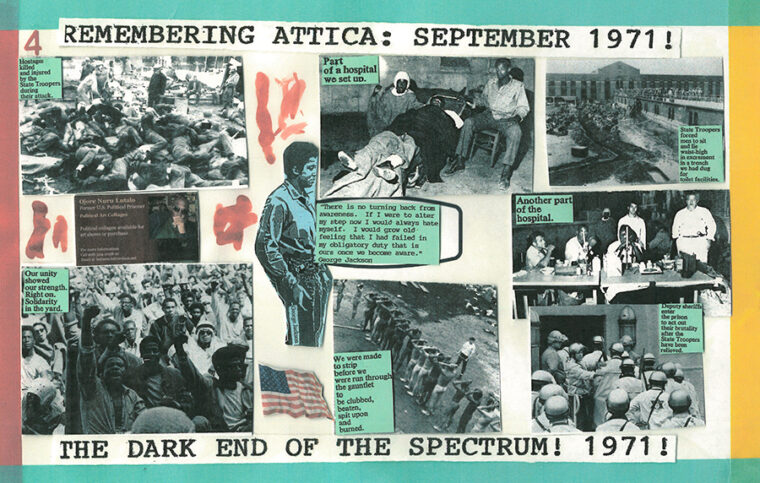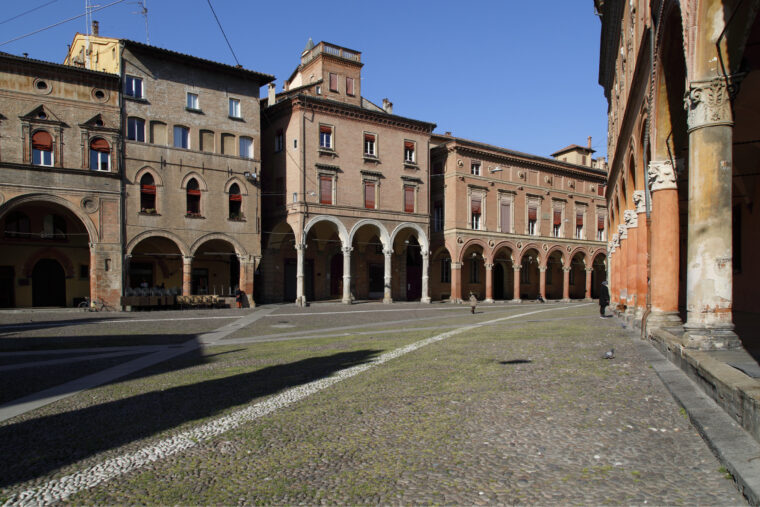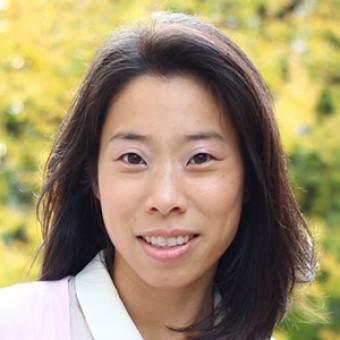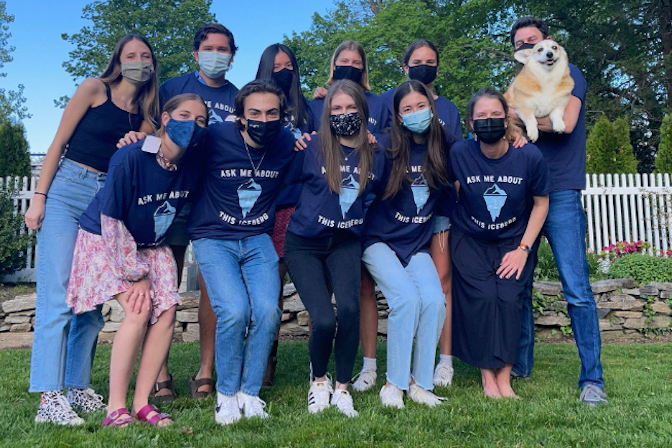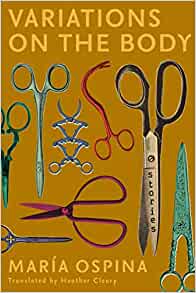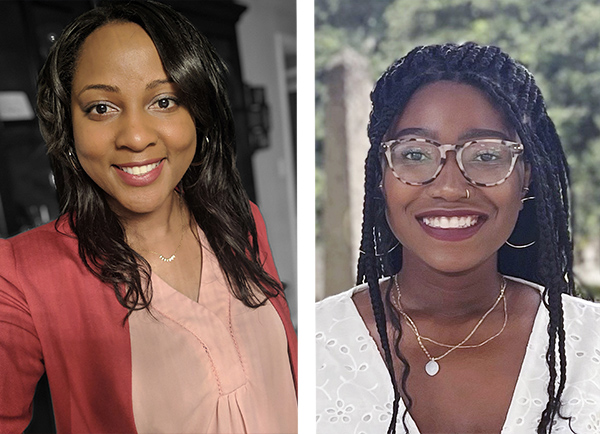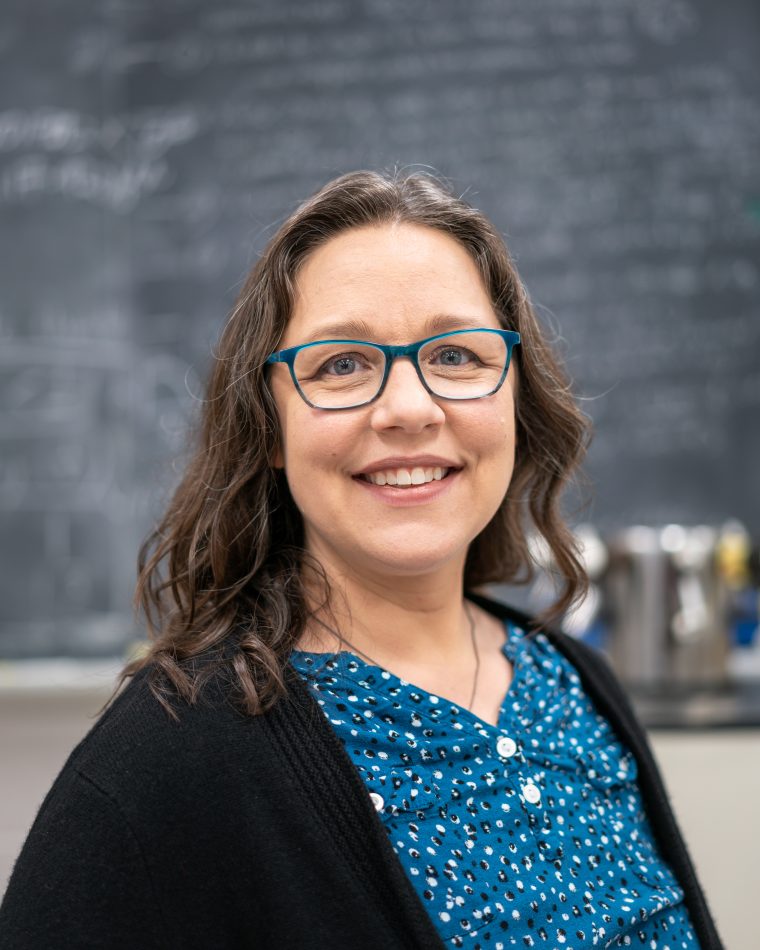Edward Torres, an assistant professor of the practice in theater, can’t help but be moved when he performs the words of L.D. Barkley, a prisoner who played an important role during the 1971 Attica Prison riot, raising morale for incarcerated men protesting their mistreatment. “We are men! We are not beasts and we do not intend to be beaten or driven as such,” Barkley said in 1971 shortly before he was killed by police. For Torres, the most devastating part of performing the new play Echoes of Attica is to know that every word is real. “This is a piece…
Associate Professor of Art History Nadja Aksamija got her first glimpse of Bologna, Italy back in 2004 as she walked from the train station towards the historic city center. It was a hot day and she dragged her suitcase down the sidewalk. Crossing Piazza Maggiore, Aksamija stepped into the shade of Palazzo dei Banchi, experiencing for the first time the city’s breathtaking porticos – extensions from the upper levels of structures that create about 37 miles of covered walkways alongside city streets. “I remember thinking that this was incredible,” Aksamija said. “It felt like a changing landscape.” While the porticos…
While teaching in New York City public and charter schools that served low-income, students of color, Roseann Liu and her fellow educators would frequently purchase basic resources such as paper, books, and classroom manipulatives for their students out of their own pockets. Students learned from outdated textbooks and teachers hungered for professional development opportunities. Teachers and parents alike understood these conditions as the norm. "Having less became natural," said Liu, assistant professor of education studies. "Most students, parents, and teachers were unaware of how sharp the disparities were between underfunded and well-funded schools." As a newly-selected National Academy of Education…
Assistant Professor of Government Alyx Mark’s aspiring law students arrived at her new service-learning class with a typical set of assumptions about how American courts work: Lawyers do most of the talking, decisions by the Supreme Court are followed to a tee by lower courts, and people who have legal problems tend to resolve them. However, most individuals' interactions with the law come through small civil actions—lawsuits, traffic court, and evictions, for example. For many people who live in low-income neighborhoods, not only is finding legal assistance difficult, but when they do access the law, often representing themselves in court,…
María Ospina, associate professor of Spanish, believes that writing fiction is another powerful way to engage the subjects that have driven her academic work—memory, violence, and culture. “Right now, I think that this is the way that I am going to continue exploring intellectual issues that interest me, including those related to history and politics,” said Ospina, who previously published a book of cultural criticism. Her debut book of short stories, Variations on the Body, has been translated into English from Spanish by Heather Cleary and was published in the United States in July by Coffee House Press. The book…
Robyn Autry, associate professor of sociology, studies racial identity, Blackness, and memory, in addition to the politics of museum development in the United States and South Africa. She is the author of eight recent articles relating to these topics. Her work includes the following: “Historical Memory-Making in South Africa,” published in The Oxford Handbook of South African History in December 2020. “Sociology’s Race Problem,” published in Aeon in November 2020. "UNC's rejection of Nikole Hannah-Jones and the Opacity of Tenure in America," published by NBC News in May 2021. “Trump’s 1776 Commission Tried to Rewrite History. Biden Had Other Ideas,”…
Nina Hagel, assistant professor of government, is a political theorist whose research focuses on questions of freedom, recognition, resistance, and democratic belonging. She often teaches courses on contemporary political theory, the history of political thought, and feminist political theory. She is working on a book manuscript on the meanings and political value of authenticity claims. In March 2021, she gave a virtual talk called “Right-Wing Populism and the Dangers of Authenticity” at the University of Alabama as part of the Political Science Department’s Colloquium. She also presented at the Conference on Philosophy and Social Science in Prague, Czech Republic in…
So long are the days of slipping out the back door of a party to avoid confrontation with a date gone bad. Through social media, one can easily "ghost"— that is, cut off all communication without giving a reason. In a new qualitative study titled "Disappearing in the Age of Hypervisibility: Definition, Context, and Perceived Psychological Consequences of Social Media Ghosting," lead researcher Royette Dubar, assistant professor of psychology, and her former master's student Jhanelle Oneika Thomas '18, MA '19 investigated both the motives and psychological consequences of the act of ghosting. Dubar and Thomas discovered that this modern-age disappearing…
In the past two years, Associate Professor of History Jennifer Tucker co-edited one book, one journal issue, two articles, two book chapters, and the headnote for a review essay, and authored eight book chapters and two articles. In addition, she has just finished a draft of her second monograph. Tucker, a historian of 19th- and 20th-century British society, focuses specifically on photographic and cinematic evidence in the fields of science, law, forensic medicine, news reporting, public trials, and the environment. Her recent work includes the following: A Right to Bear Arms? The Contested Role of History in Contemporary Debates on…
When launching spacecrafts and missiles, small navigational mistakes could lead to catastrophic results. A satellite could spin completely out of orbit, a missile could mistakenly strike a civilian territory, or a spaceship could end up at another planet altogether. Three Wesleyan researchers are collaborating on the development of a novel sensor that would benefit navigation and several other applications. The new, hypersensitive acceleration sensor is based on a principle borrowed from nuclear physics and has been developed at Wesleyan. It provides enhanced sensitivity and precision compared to conventional sensors. "Our underlying concept can be applied in a variety of sensing…
Erika Taylor, associate professor of chemistry, recently co-authored three papers and a book chapter related to (1) biomass to biofuel production and (2) development of new therapeutics to treat Gram-negative bacterial infections. Taylor's work investigates problems at the biological chemistry interface and seeks to find applications of her work to the fields of medicine and sustainable energy. Her chapter called “Lignin Enzymology – Recent Efforts to Understand Lignin Monomer Catabolism” in the book Comprehensive Natural Products III: Chemistry and Biology, and her paper “Identifying Metabolic Pathway Intermediates that Modulate Enzyme Activity: A Kinetic Analysis of the DesB Dioxygenase from Sphingobium…
In recognition of their career achievements, the following faculty members are being appointed to endowed professorships, effective July 1, 2021: Erik Grimmer-Solem, professor of history, is receiving the Ezra and Cecile Zilkha Professorship in the College of Social Studies, established in 2008. Abigail Hornstein, associate professor of economics, is receiving the Woodhouse/Sysco Professorship of Economics, established in 2002. Edward Moran, professor of astronomy, is receiving the John Monroe Van Vleck Professorship of Astronomy, established in 1982. Suzanne OConnell, professor of earth and environmental sciences, is receiving the Harold T. Stearns Professorship of Earth Sciences, established in 1984. Francis Starr, professor…


